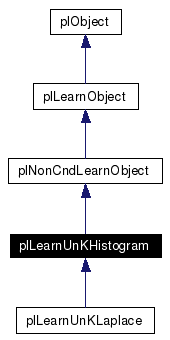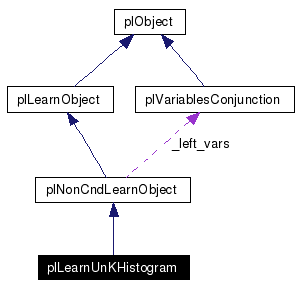
#include <plLearnUnKHistogram.h>
Inheritance diagram for plLearnUnKHistogram:


Public Member Functions | |
| plLearnUnKHistogram (const plLearnUnKHistogram &plLUKH) | |
| The copy-constructor. | |
| plLearnUnKHistogram (const plVariablesConjunction &vars, map< plDataValues, plLearnFrequence > *const initial, bool copie=false) | |
| init is a pointer on an map of initial values of frequencies. | |
| plLearnUnKHistogram (const plVariablesConjunction &vars, const map< plDataValues, plLearnFrequence > &initial) | |
| An other way to specifie that the map must be copied. | |
| void | reset (void) |
| Resets learning. | |
| void | internal_addPoint (const plDataValues &point, double weight=1.0) |
| Adds a point {point} with a given weight {weight} and updates statistics. | |
| virtual void | get_boundaries (plValues &min_ref, plValues &max_ref) const |
| Get the boundaries of each unknown definition set. | |
| virtual void | get_frequencies (map< plDataValues, plLearnFrequence > &map_ref) const |
| Add the learn frequencies to the given map. | |
| virtual void | select_frequencies (vector< plLearnFrequence > &frequencies_ref, const vector< plValues > &selected_values) const |
| The selected plValues are given in a vector, an empty vector is filled with the correspondant actual frequencies. | |
|
virtual const map< plDataValues, plLearnFrequence > & | get_map_histo (void) const |
| Return a const reference on the map of learn frequencies. | |
| virtual void | get_plProbValue (map< plDataValues, plProbValue > &prob_map_ref) const |
| If the given map is empty : return a map of plProbValues with the actual learn probabilities. | |
| virtual void | select_plProbValue (vector< plProbValue > &prob_ref, const vector< plValues > &selected_values) const |
| The selected values are given in a vector of plVlaues and a vector of plProbValues of this range id filled with the actual learn probabilities. | |
| virtual plProbValue * | select_plProbValue (const vector< plValues > &selected_values) const |
| The selected values are given in a vector of plVlaues and an array of plProbValues of this range with the actual learn probabilities is returned. | |
| void | get_frequencies (plLearnFrequence *frequencies) const |
| It is supposed you know the length of the linear array of frequencies. | |
| void | get_frequencies (vector< plLearnFrequence > &frequencies_ref) const |
| It is not i.e. | |
| void | get_frequencies (plLearnFrequence *frequencies, const plValues &min, const plValues &max) const |
| The boundaries are given in min and max and a table for this range is filled with the actual frequencies. | |
| virtual void | get_plProbValue (vector< plProbValue > &prob_ref) const |
| Fill a vector of plProbValues with the actual learn probabilities. | |
| virtual void | get_plProbValue (vector< plProbValue > &prob_ref, const plValues &min, const plValues &max) const |
| The boundaries are given in min and max and a table for this range is filled with the actual probabilites. | |
| virtual plProbValue * | get_plProbValue (const plValues &min, const plValues &max) const |
| The boundaries are given in min and max and an array of plProbValues of this range with the actual learn probabilities is returned. | |
| void | get_params (plValues ¶ms) const |
| Returns all learnt parameters of the object. | |
| plKernel | get_distribution (const void *parameters=NULL) const |
| Returns the probability table corresponding to the learnt distribution. | |
Protected Member Functions | |
| void | get_boundaries (plDataValues &min_ref, plDataValues &max_ref) const |
| Get the boundaries of each unknown definition set. | |
Definition at line 122 of file plLearnUnKHistogram.h.
|
||||||||||||||||
|
init is a pointer on an map of initial values of frequencies. The map is copied when the flag is on true. If the flag copied is positionned on false the object access the map passed when the initialization. By default the map is not copied. |
|
||||||||||||
|
Get the boundaries of each unknown definition set. Useful for construct a C array of plLearnFrequence or plProbValue. |
|
||||||||||||
|
Get the boundaries of each unknown definition set. Useful for construct a C array of plLearnFrequence or plProbValue. |
|
|
It is not i.e. your vector of frequencies is always resized |
|
|
It is supposed you know the length of the linear array of frequencies. You can get it with the get_boundaries function. |
|
|
Returns all learnt parameters of the object. This virtual method has to be implemented in all derived classes. Implements plNonCndLearnObject. |
|
||||||||||||
|
The boundaries are given in min and max and an array of plProbValues of this range with the actual learn probabilities is returned. The result is normalized. Reimplemented in plLearnUnKLaplace. |
|
|
Fill a vector of plProbValues with the actual learn probabilities. The result is resized and normalized according to the known boundaries. |
|
|
If the given map is empty : return a map of plProbValues with the actual learn probabilities. The sum of the inserted plProbValues is normalized. Reimplemented in plLearnUnKLaplace. Referenced by get_distribution(). |
|
||||||||||||
|
Adds a point {point} with a given weight {weight} and updates statistics. This virtual method has to be implemented by all derived classes. This is an internal method, do not use it directly. Use addNewPoint instead. Implements plLearnObject. |
|
|
Resets learning. This virtual method has to be implemented by all derived classes. Implements plLearnObject. |
|
|
The selected values are given in a vector of plVlaues and an array of plProbValues of this range with the actual learn probabilities is returned. The result is normalized. Reimplemented in plLearnUnKLaplace. |
|
||||||||||||
|
The selected values are given in a vector of plVlaues and a vector of plProbValues of this range id filled with the actual learn probabilities. The result is normalized. Reimplemented in plLearnUnKLaplace. Referenced by get_distribution(). |
 1.4.1
1.4.1